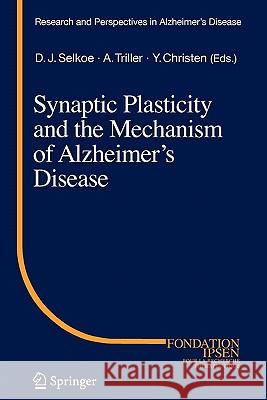Synaptic Plasticity and the Mechanism of Alzheimer's Disease » książka
Synaptic Plasticity and the Mechanism of Alzheimer's Disease
ISBN-13: 9783642095191 / Angielski / Miękka / 2010 / 183 str.
During most of the 20th century, neurodegenerative diseases remained among the most enigmatic disorders of medicine. The scientific study of these conditions was descriptive in nature, detailing the clinical and neuropathological phenotypes associated with various diseases, but etiologies and pathogenic mechanisms remained obscure. Beginning in the 1970s, advances in two principal areas biochemical pathology and molecular genetics combined to yield powerful clues to the molecular underpinnings of several previously "idiopathic" brain disorders. Among the classical neurodegenerative diseases, perhaps the most rapid progress occurred in research on Alzheimer s disease (AD). In disorders like Huntington s disease, amyotrophic lateral sclerosis and even Parkinson s disease, unbiased genetic screens, linkage analysis and positional cloning have identified causative genes that subsequently allowed the formulation of specific biochemical hypotheses. In sharp contrast, modern research on AD developed in the opposite order: the identification of the protein subunits of the classical brain lesions guided geneticists to disease-inducing genes, for example, APP, apolipoprotein E and tau. Thus, a biochemical hypothesis of disease - that AD is a progressive cerebral amyloidosis caused by the aggregation of the amyloid b-protein (Ab) - preceded and enabled the discovery of etiologies. As progress in deciphering genotype-to-phenotype relationships in AD accelerated during the last two decades, it became apparent that the key challenge for understanding and ultimately treating AD was to focus not on what was killing neurons over the course of the disease but rather on what was interfering subtly and intermittently with episodic declarative memory well before widespread neurodegeneration had occurred . In other words, one wishes to understand the factors underlying early synaptic dysfunction in the hippocampus and then attempt to neutralize these as soon as feasible, perhaps even before a definitive diagnosis of AD can be made. This steady movement of the field toward ever-earlier stages of the disorder is exemplified by the recognition and intensive study of minimal cognitive impairment amnestic type (MCI; . And yet patients who die with a diagnosis of MCI have been found to already have a histopathology essentially indistinguishable from classical AD . Therefore, even earlier phases of this continuum are likely to become recognized, and these might show milder histopathology and might have biochemically, but not yet microscopically, detectable Ab species that mediate synaptic dysfunction. This volume serves as a record focused on bringing together investigators at the forefront of elucidating the structure and function of hippocampal synapses with investigators focused on understanding how early assemblies of Ab may compromise some of these synapses. "











